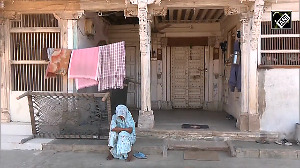

The heavy night fog had reduced visibility to almost zero as retired Captain Janmej Singh and his wife left Pathankot for Jammu on January 2 with two of their relatives. The familiar 110-kilometre stretch between the two towns took several hours to negotiate.
"In my mind, I knew my son was dead. But I did not tell anyone," Captain Singh, a retired army officer, says of the evening of January 2 when Lieutenant Triveni Singh walked out of the anonymity of his military uniform into the heroic pages of India's constant fight against terrorism.
Captain Singh was surfing channels on television when reports of a terrorist attack on the Jammu railway station were aired. The station was filled with hundreds of people and security personnel. Janmej Singh continued to watch television channel Aaj Tak's report on the operation undertaken first by the police and then by the paramilitary forces to take out the two, heavily-armed Lashkar-e-Tayiba terrorists.
"After a while, I noticed a headline scrolling at the bottom of the screen," he recalls. It said an army officer had been killed in the operation. "Then they put out a flash naming the officer; it was my son, Lieutenant Triveni Singh."
 Captain Singh immediately called his son's unit, the 5 Jammu and Kashmir Light Infantry. "The officer at the other end said Triveni was all right. But I insisted on speaking to his superior. The media does not lie, I said," he recalls.
Captain Singh immediately called his son's unit, the 5 Jammu and Kashmir Light Infantry. "The officer at the other end said Triveni was all right. But I insisted on speaking to his superior. The media does not lie, I said," he recalls.
When he was told the unit's superior officers were at the railway station, Captain Singh immediately decided to leave for Jammu. As January 3 quietly slipped in, the family reached Jammu, their minds filled with uncertainty. When they met Triveni Singh's unit, they were told of how their son's heroism had saved many lives. Then, they saw their only son's body.
It was an unusual act of bravery that brought 25-year-old Triveni Singh to the nation's attention.
He was adjutant of his unit and was in the room adjoining the commanding officer's office when information about the terrorist attack came in. The commanding officer asked Triveni to alert the officers and the soldiers on duty at the barracks to move to the Jammu railway station. Triveni believed this would delay the operation. He suggested, instead, that he be allowed to lead the Quick Reaction Team to tackle the terrorists.
As the team neared the railway station, Triveni was told the terrorists were firing indiscriminately. Seven lives -- including that a policeman, two BSF jawans, one railway policeman and two civilians -- had already been lost. Several others were injured.
In order to save time, he asked his driver to race the jeep across the railway tracks towards the captive station. Triveni, who was leading his men from the front, succeeding in eliminating the first terrorist. He targeted the second one, who lobbed a grenade at him. According to army records, Triveni shot dead the second terrorist despite sustaining serious injuries in the grenade attack. The young officer then reported to the general officer commanding his division. "Task accomplished," he said, before collapsing.
"Let every mother give birth to children like Triveni who refuse to abandon their guns and run away from the battlefield even if their decision costs them their life," says his proud mother, even as the tears well in her eyes.
Triveni was proud of being a soldier, his family recalls. His eldest sister, who is married and lives in the United States, once asked him what gift he wanted. "A combat kit," he replied.
![]()
You might also like to read...
![]()
![]()
![]()
![]()
'He gave his life for the nation'![]()
Ashok Chakra for Lt Triveni Singh, Sanjog Chhetri![]()
Lieutenant Triveni Singh: A real life hero![]()
![]()
![]()
Joining the army was not initially an option for the young man who became such a brave soldier. He was selected to join the Naval Academy after he passed the 12th standard exam, but he gave into his family's wishes and opted for a BSc in agricultural science instead. "We thought he would come back and look after the family farm," says Captain Singh. Their farm is spread over 40 acres.
Fate had other things in store for this national level athlete in karate and swimming. Triveni was unable to resist the call of the armed forces. After he graduated, he appeared for the Combined Defence Services (CDS) examination and was selected by the Service Selection Board. This time, he refused to budge and his parents gave in.
After his commission into the 5 Jammu and Kashmir Light Infantry in 2001, Triveni participated in several major operations in Jammu and Kashmir. His father recalls how he was part of an operation that hunted down two of the terrorists who had attacked a Dogra unit barrack on June 28, 2003. Seven soldiers, including an officer, and 12 others were injured in the attack on the unit.
His father says Triveni actually chased the second terrorist across a field and killed him. Such was his dedication to the nation and to his duty.
"It is his reaction to any situation that reveals the mettle of a man. There were hundreds of people from all communities at the Jammu railway station. How you reach the place and how you achieve your target decides the number of innocent people who will live or die. Within 15 seconds of beginning the operation, Triveni had achieved his target," says his proud father.
Triveni's mother eyes moisten. "He was our hope and our pillar," she says, "but he is gone." The Singhs have two more children: Pooja who lives in the US and Jyotsana who is studying for a master's degree in computer applications. "I am proud, but at the same time I am sad. He has done well for the country and saved hundreds of lives. I am sad because he is not with me when I am in the evening of my life. I am a very proud father. His memory will take us along," says Janmej Singh.
Photographs: Saab Press
Image: Rahil Shaikh






 © 2025
© 2025